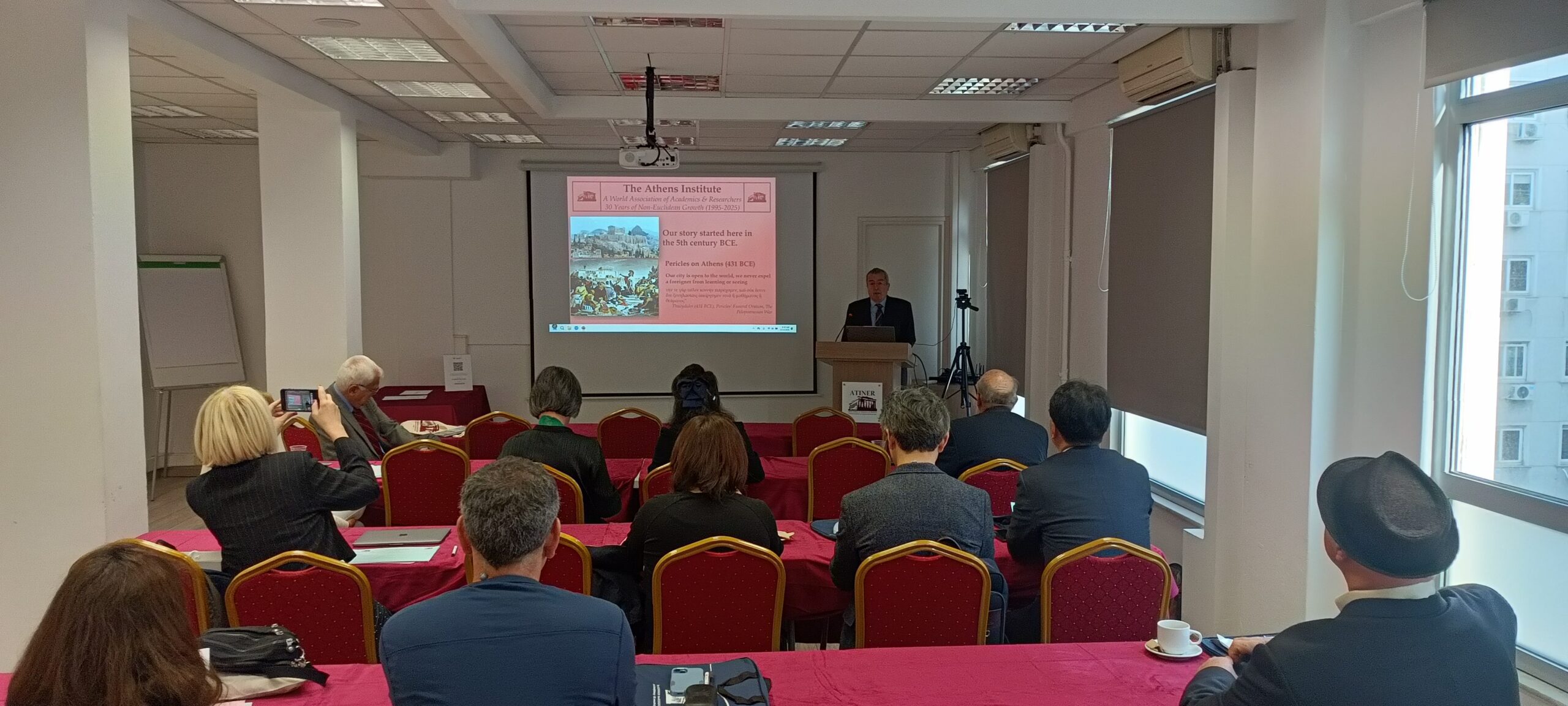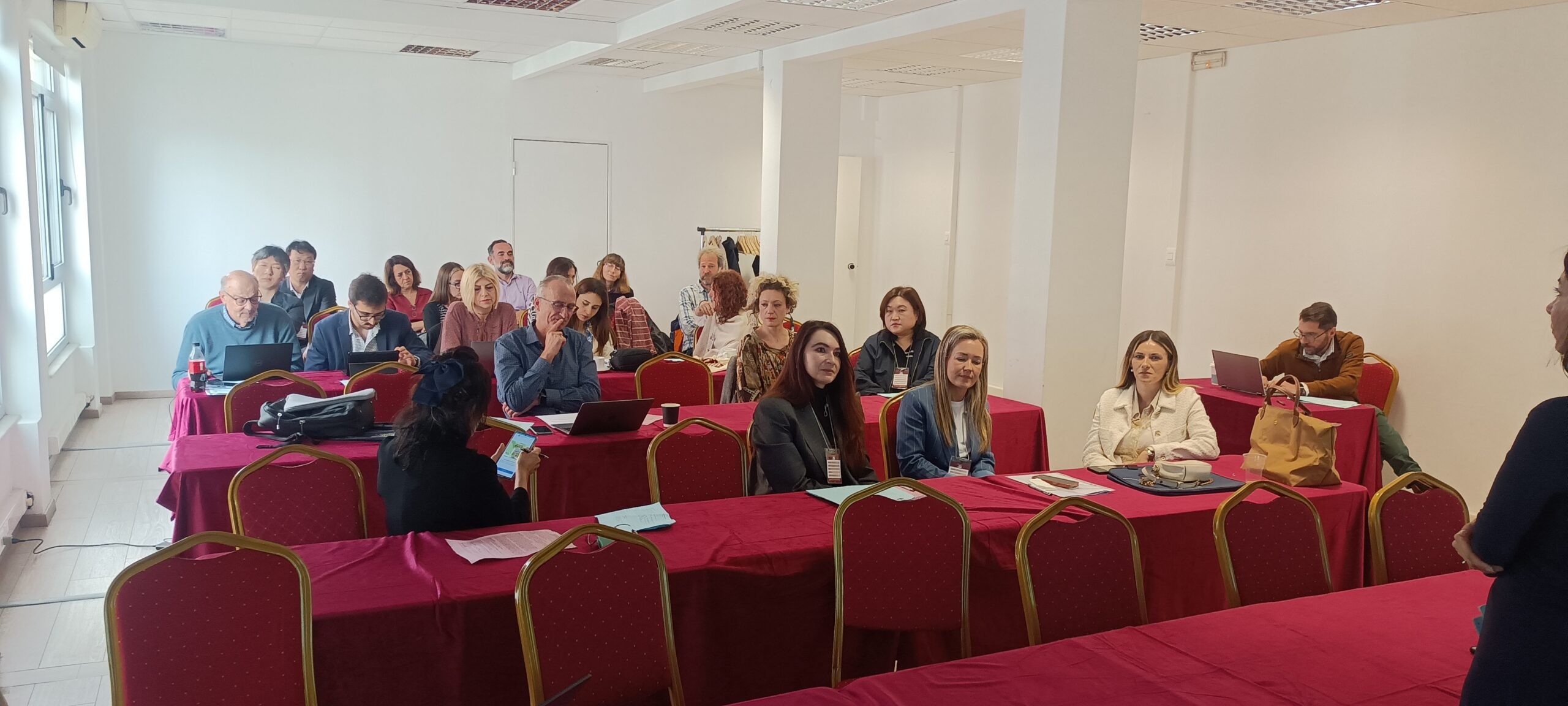The Athens Institute
A World Association of Academics and Researchers: Promoting Global Education & Research
1995-2025: 30 Years of Bringing Academics and Scholars together in Athens
18th Annual International Conference on Mediterranean Studies
Monday 14 & Tuesday 15 April 2025 – Athens Institute’s Downtown Venue
We are glad to announce the successful organization of the 18th Annual International Conference on Mediterranean Studies event, held on Monday 14 & Tuesday 15 April 2025, at the Athens Institute. The program is available at: www.atiner.gr/2025mdt-pro
30 esteemed scholars from 11 diferent countries (Bulgaria, Croatia, France, Greece, Israel, Portugal, South Korea, Spain, Turkey, the UK, and the USA) came together to present their research, offering thought-provoking perspectives on history, culture, urbanism, public health, and contemporary social dynamics in the Mediterranean and beyond.
The conference began with Steven Oberhelman (Texas A&M University, USA), who explored the role of doctors and healthcare during the Greek War of Independence, followed by Bok Hee Kim (Gyeongkuk National University, South Korea), who examined Homer’s athletics through the lens of heroic virtue
and arete. Dario Borim (University of Massachusetts Dartmouth, USA) presented on memory, identity, and anthropology in literary narrative. Gregory T. Papanikos (President, Athens Institute) offered a cliometric analysis of the Thucydides Trap and its relevance to the Ottoman Empire’s trajectory.
Ivana Podnar (University of Zagreb, Croatia) discussed the industrial transformation of Adriatic island iconography, while Zlatina Bogdanova (Bulgarian Academy of Sciences) shed light on architectural heritage and urban regeneration in Bulgaria. Elif Ceren Tay (Yıldız Technical University, Türkiye) focused on the identity-shaping role of Galata’s historic walls. Lisa Hughes (The Colorado College, USA) explored cultural imagination and tourism in Greek wedding-themed Hollywood films.
Urban strategies for inclusivity were addressed by Anahita Malek (Buckinghamshire New University, UK), while Jessica Boll (Carroll University, USA) reflected on Mediterranean cross-cultural dining traditions. Marta Torres (NOVA University Lisbon, Portugal) presented on literacy and the heritage of fishing communities in Costa da Caparica. Religious and historical narratives were explored by Serge Ruzer (Hebrew University of Jerusalem), who analyzed late antique Jewish and Christian travelogues. Yaffa Moskovich (Zefat Academic College, Israel) discussed the role of hybrid religious voluntary civil organizations within the Israeli military.
Andreu Orti-Mondejar (University of Valencia, Spain) examined the concept of empire in Catalan literature of the late Middle Ages. Denis Bernardeau Moreau (University of Lille, France) shared a study on soft skills and student reflexivity. From the University of Cádiz, Guadalupe Ortiz and Alfonso Garcia-de-Prado presented on the use of software customization to improve self-care and wellbeing, and also outlined a strategy for air quality monitoring to promote healthier habits.
Legal innovation was a theme in talks by Ana Danic Ceko (Josip Juraj Strossmayer University of Osijek, Croatia), who presented the Green Legal Clinic, and Jelena Kasap and Visnja Lachner (same institution), who analyzed legal transactions of widows in medieval Dalmatian and Kvarner statutes. Raquel Perez Estebanez (Complutense University of Madrid, Spain) presented on the performance impact of ESG factors in European businesses. Pinar Akinci Acar (Istanbul Medipol University, Türkiye) and Mujdelen Ipek Yener (Marmara University, Türkiye) explored organizational behavior through Foucault’s notion of parrhesia.
Economic themes were further explored by Pedro Fernandez Sanchez and Maria del Carmen Garcia Centeno (Universidad San Pablo CEU, Spain), who analyzed short- and long-term convergence in Mediterranean economies. The medical history segment featured Jongkuk Nam (Ewha Womans University, South Korea) discussing the 1575–1577 plague in Venice, SangDong Lee (SungkyunKwan University, South Korea) revisiting the Justinian Plague from a pathological view, and Myongjoo Shin (Ewha Womans University) tracing Ancient Rome’s response to epidemics through the introduction of Asclepius.
The conference was marked by vibrant academic exchange, cross-cultural insight, and a multidisciplinary spirit. We extend our deepest gratitude to all presenters and participants for their scholarly contributions and for making the event a resounding success.





